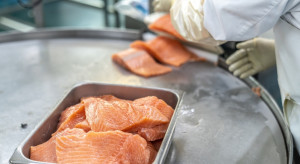EU regulations introducing a time limit in the so-called Stiffening in salmon processing raises serious concerns for the industry, the Polish Association of Fish Processors said on Friday. According to the organization’s data, 240,000 tons of Norwegian salmon worth EUR 1.4 billion are processed annually in Poland.
The regulation adopted on Thursday by the European Parliament amending EU regulations on the hygiene of food of animal origin, introducing a time limit in the so-called Stiffening in salmon processing, a key method used by producers, raises serious concerns in the industry – the Polish Association of Fish Processors (PSPR) reported on Friday.
Reducing stiffening time will complicate logistics
According to PSPR director Arletta Wenderlich, so far EU regulations have not limited the time of keeping the semi-finished product at stiffening temperature (approx. minus 11 degrees C) before slicing smoked fish. Reducing the maximum period for stiffening and slicing smoked fillets to 96 hours will complicate the logistics process.
“Processing companies need up to 2 weeks for this operation in order to deliver the product to retail chains without any problems. The size of orders is not constant – sometimes they are smaller, sometimes larger. Therefore, it is sometimes necessary to keep the smoked fillets at the stiffening temperature for a longer time. Now, after 96 hours, the product will be treated as unfit for consumption and will have to be disposed of,” said Arletta Wenderlich, director of PSPR, in an interview with PAP.
According to Wenderlich, such a restriction has no scientific justification, and smoked fillets kept at stiffening temperature are safe to eat for a much longer time.
“Research conducted by renowned European laboratories shows that even after 180 days they are completely safe for health. Of course, it was not the intention of the processing plants to store semi-finished products for such a long time,” she emphasized. She also pointed out that the entry into force of new regulations will mean that Polish companies may not be able to fulfill the orders of many foreign customers. “This applies, among others, to the German market, where Polish companies are the main suppliers of smoked salmon,” Wenderlich noted.
Polish fish processing sector – numbers, data, turnover
According to the association, the Polish fish processing sector currently employs approximately 20,000 workers, including six thousand in the salmon processing sector. 17 percent Norwegian fish exports undergo processing in Poland. Imports of Norwegian salmon to Poland amount to approximately 240 thousand tons per year and are worth nearly EUR 1.4 billion. Polish fish processing ranks third in terms of turnover in the EU (EUR 3.423 billion) with 12%. participation.
According to the data provided by PSPR, the annual turnover of the fish processing industry in 2022 amounted to PLN 16.08 billion. At that time, Poland exported fish products to 86 countries, and their value in Polish exports reached EUR 2.8 billion. The value share of salmon products in the total Polish export of fish products was 60 percent, with 54.8 percent the exported salmon was smoked fish. The share of salmon products in total Polish exports of food products is 4%. As reported by PSPR, only the two largest salmon processing plants in Poland produce over 530,000 salmon per day. portions of salmon with an average weight of 180 grams.
As Wenderlich emphasized, PSPR – citing expert opinions – actively tried to change unfavorable provisions at every legislative stage, pointing out, among others, in the association’s opinion, there were significant shortcomings, primarily the lack of an opinion from the European Food Safety Authority (EFSA).
“After the vote, Polish political coordinators operating in the Committee on the Environment, Public Health and Food Safety (ENVI) in the European Parliament decided that despite the adoption of changes in the Delegated Act, the Parliament should send a request for an opinion on the new regulations to EFSA. This the opinion may make further changes to the Regulation possible,” Wenderlich said.
The future of the Polish fish processing sector?
One of the largest companies in the industry, Mowi Central Europe, also commented on the European Parliament’s decision. “We must and will operate in new conditions. Despite the undoubted complications, we will continue to make every effort to provide our customers with safe, high-quality products. Practice will show the impact of the new regulatory framework on our operations and products,” said Emila Schomburg, spokeswoman for the company.
On Thursday, the European Parliament adopted a draft EC delegated regulation on hygiene requirements for certain animal products, including fishery products. The new regulation introduces stringent standards limiting the stiffening period of fish to a maximum of 96 hours.


